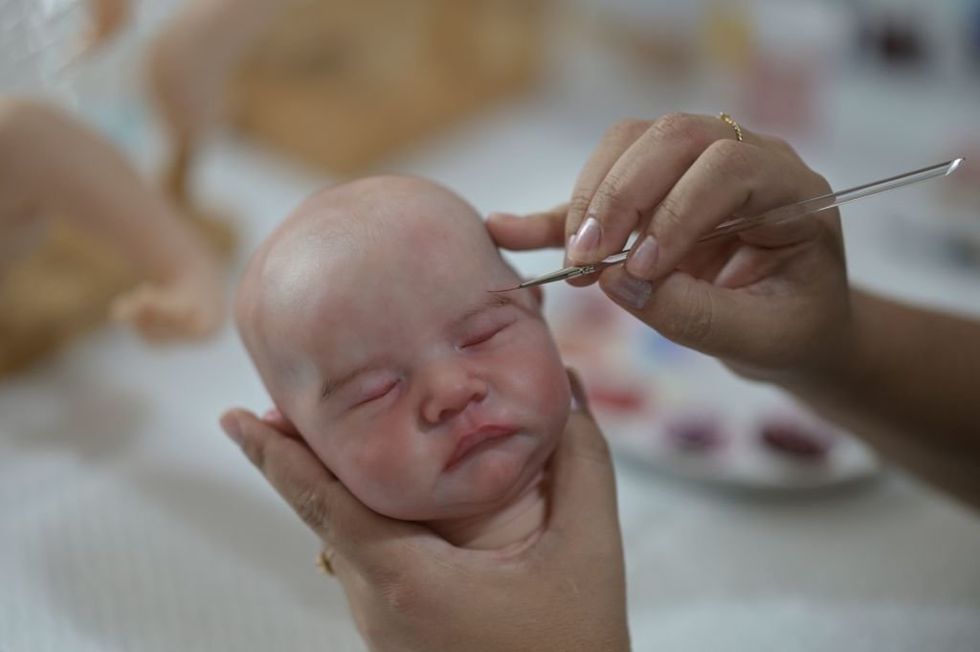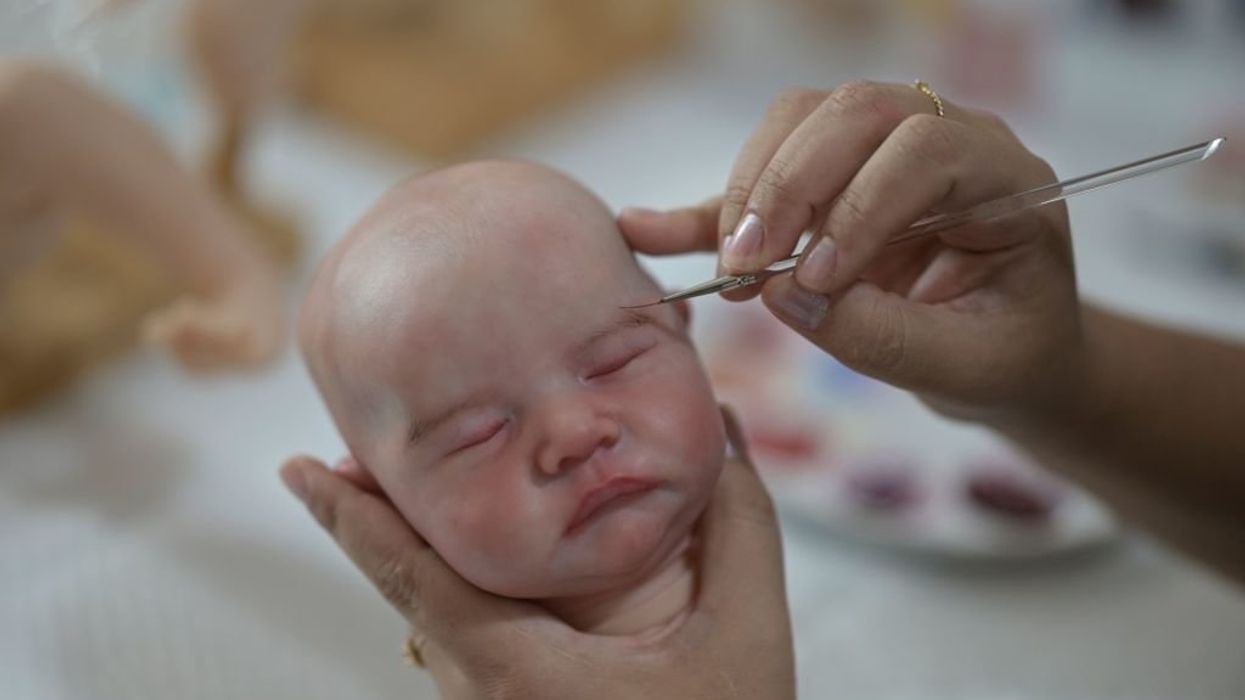The American women forking out $8,000 for fake babies


On paper, American women are thriving. More empowered than ever. More degrees, more jobs, more titles. Career ladders scaled. Glass ceilings shattered. The feminist dream, it seems, has been delivered — signed, sealed, and institutionalized. In reality, the dream has turned into something more like a nightmare.
Live Your Best Retirement
Fun • Funds • Fitness • Freedom
If you need proof, meet the American women spending as much as $8,000 on fake babies. These 30- and 40-somethings are paying top dollar for a replica of the life they were told to deride and dismiss.
Endless eerie crib shots show grown women displaying their plastic progeny with captions like “Meet Carol! My first baby.”
Welcome to the "reborn" doll phenomenon, where grown women spend small fortunes on silicone infants designed to scratch maternal itches they can't otherwise satisfy. Some might see these as toys. I see them for what they are: therapeutic stand-ins for the children many women delayed, dodged, or lost while chasing careers, comfort, or clout.
Doll parts
The statistics tell the real story behind this bizarre trend. Alcohol dependency among American women has increased dramatically over the past decade. Antidepressant usage has skyrocketed. Anxiety disorders plague an entire generation of women who were promised that professional success would fulfill every human need. Now they're cradling rubber babies in Starbucks, defending their "parenting" choices to strangers who mistake their dolls for actual infants.
The craftsmanship behind these synthetic children is genuinely disturbing. Artists spend hundreds of hours painting individual veins, threading alpaca hair into tiny scalps, and perfecting the weight distribution to mimic real newborns. Buyers enhance the creepy charade further with baby perfumes, realistic heartbeat devices, and breathing mechanisms.
'One that doesn't cry'
There are even conventions now — full weekends dedicated to celebrating the pathology.
Witness the expos for yourself. Rooms filled with females proudly parading their collections. Some women own dozens of these fake infants, treating each one as a legitimate family member. They discuss feeding schedules, clothing preferences, and personality traits of pricey props that possess none of these qualities. It’s the saddest sight since cats in strollers or gender reveal parties with smoke machines — though at least those involve real human babies.
One doll owner put it with blunt, almost shameless honesty: “Sometimes I just want one that doesn’t cry.” The preference is revealing. They want the look of motherhood without the labor of actual life.
Another devotee bemoaned the social stigma: “Unfortunately, we get a lot of hate in the doll community. They say, ‘Oh my God, these crazy doll people.’” The self-awareness somehow makes the delusion worse.
 Photo by Julia Beverly/WireImage
Photo by Julia Beverly/WireImage
A spiritual crisis
Reddit’s reborn doll community offers a window into the warped world. Endless eerie crib shots show grown women displaying their plastic progeny with captions like “Meet Carol! My first baby.” The comment threads read like parenting forums for objects that will never grow, never speak, never return the love (or the lunacy) lavished on them.
The media loves to spin this as therapy. Experts line up to call it healing: a balm for miscarriage, infertility, childhood wounds. But that framing is a smoke screen. It treats the symptom as the cure. It asks no hard questions about what kind of society leaves women so starved for connection that they end up mothering manufactured monstrosities.
The following might sound harsh, but it needs to be said: If the answer to grief and loneliness is a lifelike mannequin, then the real crisis isn’t reproductive. It’s spiritual — a deep disconnection from purpose, from creation, from the very design of what it means to love and be loved.
A generation betrayed
The demographic buying these dolls reveals a staggering betrayal of human potential. Many are highly educated, professional women who traded their most fertile years for corporate advancement, gambling that motherhood could be indefinitely postponed. They chose boardroom presentations over baby bottles, assuming biology would wait for their convenience.
These aren’t uneducated or uninformed women. They’ve sat through gender theory seminars, memorized the language of patriarchal oppression, and can recite all 72 recognized sexes without missing a beat.
They’ve earned degrees in everything but wisdom. Because while universities can teach you how to critique capitalism and deconstruct language, they can’t teach you when to start a family — or why that might matter more than another promotion. The result is tragic: a generation fluent in progressive theory and completely lost in life’s most basic truths.
Each story represents a catastrophic failure of the promises made to American women over the past 50 years. They were sold a poisonous lie: Career success would provide complete fulfillment. Marriage and motherhood were rebranded as outdated lifestyle choices rather than fundamental human drives. The biological clock was dismissed as patriarchal propaganda designed to suppress female ambition.
The reality proved devastating. Women discovered that corner offices don't satisfy maternal instincts. Six-figure salaries don’t replace the irreplaceable joy of watching your child take her first steps. Professional milestones, no matter how glittering, feel weightless when there’s no one to share them with — or pass them on to.
Baby boom
The therapeutic industry has quickly monetized this desperation. Counselors now recommend reborn dolls as treatment for everything from PTSD to dementia. Support groups help women "bond" with their sham infants. Online communities provide parenting advice for caring for objects that require no actual care. The commercialization of maternal grief has created industries that profit from women's disconnection from family, from nurturing, from the natural longing to create and care for life.
Think about the lunacy of it. You can conceive a real child for free — and in return, receive a lifetime of unpredictable, sometimes maddening, ultimately glorious meaning. Instead, they’re spending thousands of dollars for a lifeless imitation.
A fake baby can cost as much as a Skyview Suite at Wimbledon, a watch you’ll probably never wear, or the kind of therapy that might explain why you need one in the first place.
This preference for artificial relationships reflects a broader collapse in human connection. Dating apps killed off courtship. Social media turned friendship into performance. Online communities offer the idea of belonging with none of the burden of real commitment. The depressing doll phenomenon represents the logical end point — synthetic motherhood for women too damaged or selfish to embrace the real thing.
The plastic progeny never cries because it never lives. Neither, it seems, do many of the women who buy them.
Originally Published at Daily Wire, Daily Signal, or The Blaze
What's Your Reaction?
 Like
0
Like
0
 Dislike
0
Dislike
0
 Love
0
Love
0
 Funny
0
Funny
0
 Angry
0
Angry
0
 Sad
0
Sad
0
 Wow
0
Wow
0









































































